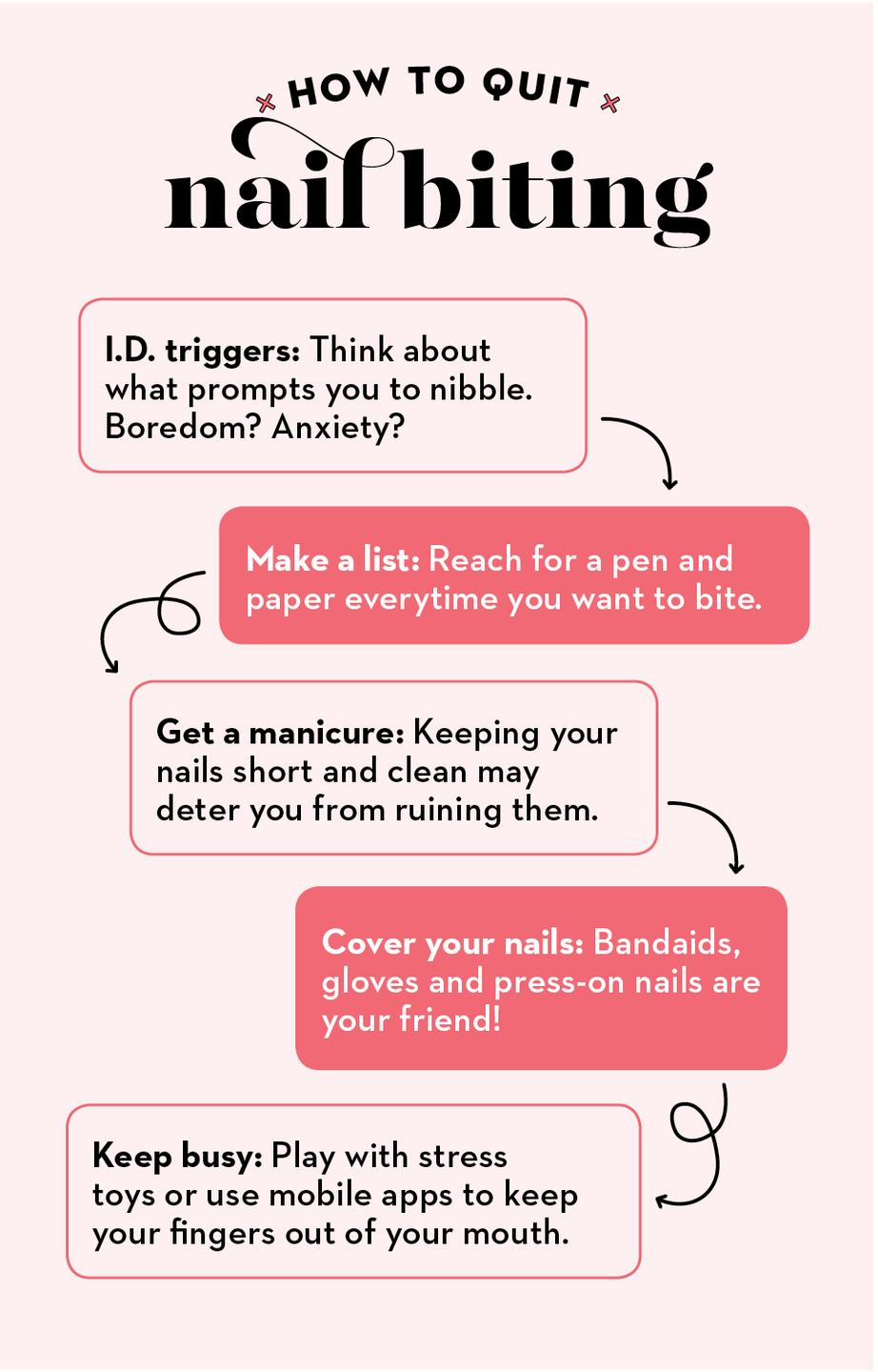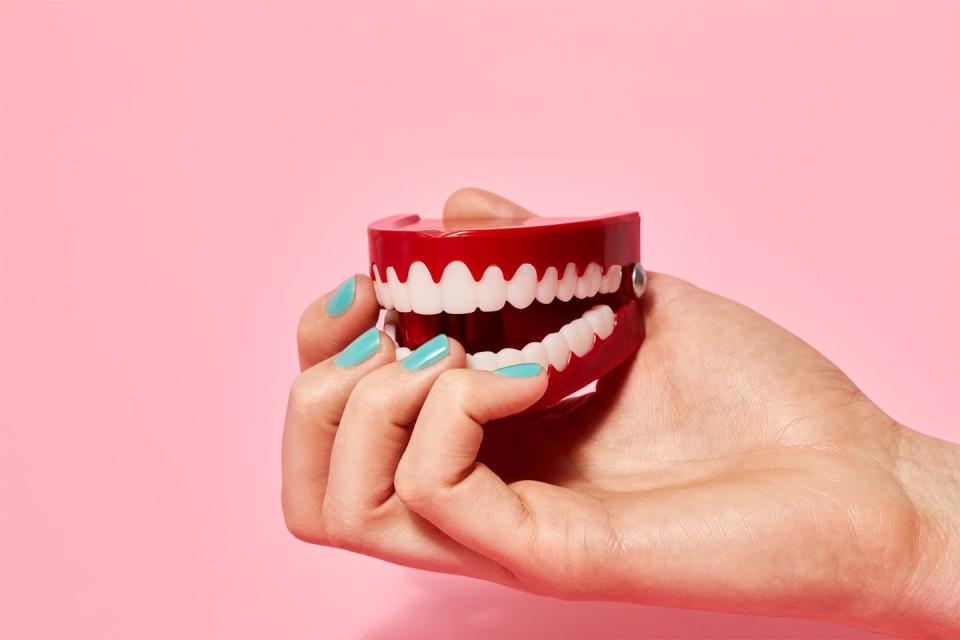Press-On Nails May Be the Best Defense Against Nail Biting

Do you have a bad habit of biting your nails whenever you're anxious, stressed or bored? You're not alone. In fact, nearly 20 to 30% of the population have the same habit — but the seemingly innocuous behavior is actually not as harmless as you might think. When left untreated, chronic nail-biting can lead to a slew of health problems, including infections and other hygiene issues (not to mention you'll never get those dream nails you always wanted!).
Of course, if you're one of the many people who can't help but constantly nibble on their nails, you already know that it's an extremely tough habit to kick — especially since most of the time you're doing it without realizing it. Luckily, there are a few ways to overcome the urge once and for all. If you're wondering how to stop nail biting for good and finally get strong, healthy nails that haven't been incessantly gnawed on, here are some of the best expert-approved tips to finally kick the bad habit to the curb.

Why do I bite my nails?
Before trying to stop your nail-biting habit, it's important to know the causes behind the behavior — or onychophagia, as medical experts call it in clinical settings. According to Rebecca Rialon Berry, Ph.D., a licensed psychologist and director of the Tics, Tourette Disorder, and Trichotillomania Program at the Child Study Center at NYU Langone Health, nail-biting falls along the lines of a type of behavior in the clinical world called body-focused repetitive behaviors, or BFRBs, which refer to any repetitive self-grooming behaviors that damage the skin, hair or nails.
Why is it that we engage in these types of behaviors? Research suggests that more likely than not, there's a genetic cause behind this tick. But there are also a number of environmental triggers that manifest the onset of nail-biting behavior — including stress, anxiety, boredom and other forms of emotional distress. "Sometimes people engage in these behaviors because they're actually feeling underwhelmed, under-stimulated or bored," adds Berry. "And then there is a subset of people that could be working more automatically as part of a stress response."
What are the health risks associated with biting nails?
Though nail-biting may seem like a harmless habit, there are a number of risks associated with the behavior — mainly, but not limited to, various kinds of infections. "Nail biting can cause open or raw skin and those areas are exposed to bacteria in the mouth, potentially leading to skin infections," says Joshua Zeichner, M.D., director of cosmetic and clinical research in dermatology at New York's Mount Sinai Hospital. "These infections may become severe in some cases and can cause permanent nail disfiguration."
Besides skin infections and nail deformities, other risks include damage to your teeth and even jaw problems in extreme cases. It's also a major cleanliness issue, especially during the COVID-19 pandemic — your hands and nailbeds can be a breeding ground for germs when you're in public, and hand hygiene is crucial here. While it's not believed that COVID-19 primarily spreads through inoculation (i.e. putting dirty fingers in your mouth!), it's always best to exercise caution while in public.

How to stop biting your nails:
You may not be able to break the habit overnight, but with a little time and effort, you can work to curb your nail-biting urge for good. Here are our experts' best tips and strategies to finally stop biting your nails.
Identify your triggers.
If you're trying to stop biting your nails, the first thing you should do is to take a hard look at where in your day you're commonly engaging in the behavior, advises Dr. Berry. You may, for example, notice that you often start nibbling when you're scrolling through emails, doing work or watching TV. "We want to look specifically at what a person is doing, where they are, who's around them, what are they feeling," explains Berry. "Is there any emotional connection of boredom, anxiety, etc., that are potentially contributing and reinforcing the behavior?"
Once you know what exactly kicks you into the nail-biting drive, you can take the next step to modify your environment to make it harder to engage in the habit. If you find that you most often start biting your nails when you're doing work in your bedroom alone, for instance, you can try sitting in the dining room instead and doing it around other people, which can help you become more aware and conscious of the behavior.
Make a running list of urges.
If you're monitoring your nail-biting triggers in real-time, the next step you should take is physically keeping a list of how frequently you wish to bite your nails on a notepad (or a digital note). It sounds like a lot, we know, but doing so may break your habit by default, explains Meghan McMackin, Ph.D., a clinical postdoctoral fellow at Austin Anxiety and OCD Specialists.
"The act of self-monitoring can reduce the behavior in and of itself — it's difficult to write or type and bite your nails simultaneously," McMackin explains. "Taking a moment to log your nail-biting requires you to break the rhythm of the nail-biting and reflect on the behavior. After doing so, many people are able to skip biting their nails in that specific moment, gradually targeting the habit."
Address beneath-the-surface emotions.
Sometimes, the trigger causing you to stick your fingers in your mouth isn't physical, but emotional. In this case, changing your surroundings won't help too much on its own, says Heather Edwards, LMHC, a New York-based psychotherapist. If you can't determine a physical prompt that's pushing you to bite your nails, think about the thoughts or feelings that came just before you decided to nibble.
"What was your internal monologue in this moment? Sometimes, we language ourselves into unhealthy coping strategies," Edwards tells Good Housekeeping. "What did you say to yourself about a situation or a feeling that led to you biting your nails? Can you challenge that train of thought or self-talk?" More often than not, you may be anxiously reacting to thoughts or feelings when you begin to bite your nails as a coping mechanism. Is there anything that would work better in this case? Sometimes, keeping your hands busy elsewhere while dealing with anxiety or stress-related emotions can feel much easier if you're actively recognizing these emotions ahead of time.
Keep your nails short.
You might tend to bite your nails more when they're long — which is why it's a good idea to trim them short to help yourself kick the habit. If there's not enough nail for you to grab with your teeth, it won't be as satisfying when you go to bite them! (Plus, short nails are easier to maintain and are generally more hygienic than long nails.)
Get a nice manicure.
Want an extra reason to stop chewing on your nails? Try splurging on a nice manicure at the nail salon (or try a dip powder kit at home) — you'll be less likely to want to ruin them by biting if you've spent money and effort to make them look so nice.
Coat your nails with a bad taste.
"One of the most common ways to stop nail biting is to apply a foul-tasting lacquer to the nails," says Dr. Zeichner. "If you don’t like the taste, then you will stop putting it in your mouth." For this exact reason, there are a variety of special nail polishes that have a bitter taste to them to prevent you from biting your nails, like ORLY No Bite Nail Bite Deterrant, or ella+mila No More Biting, which Berry recommends if you're looking for a kid-friendly version. The terrible taste will definitely make you think twice before nibbling!
Cover your nails up.
If a manicure doesn't do much to stop you from biting, try finding a way to cover your nails up. "You want to put some blocks and methods in place to make it impossible to bite," Dr. Berry explains. This can be something like putting on gloves, band-aids, or even press-on nail sets — whatever that can physically hinder you from being able to get to your nails with your mouth.
Keep your hands or mouth busy.
A good way to stop yourself from biting your nails is to engage in something else with your hands or mouth to channel that energy into some other behavior — you may, for instance, want to try keeping your hands busy by playing with something like sandpaper, which can provide the sensory stimulation you're looking for, says Berry. Other items that you can fiddle with instead of biting your nails include stress balls or fidget toys. Or if you're looking for something to keep your mouth busy, you can even try chewing gum!
Use technology to your advantage.
There is a suite of free mobile applications that are designed to help you stop nailbiting, including top-rated options like Quit That! and Nomo. Some applications are designed to be used with technology like smart watches (as well as other standalone devices) to remind yourself not to bite your nails. A favorite for McMackin's patients is the HabitAware bracelet, which is a device of it's own that vibrates each time you raise your nails to your mouth.
"Users train the bracelet to recognize motions that characterize the behavior they are attempting to reduce. Then, the bracelet alerts them when it detects that they are engaging in the identified behavior," McMackin says. "Some people have found success with this method because it takes much of the work out of self-monitoring."
When it's time to seek help:
If all else fails, you might want to consider finding a therapist, as nail-biting can be a sign or symptom of a more serious problem such as obsessive-compulsive disorder (OCD) or another anxiety disorder — though it's also important to note that the behavior can occur outside of these conditions. Regardless, if your nail-biting is causing significant distress or dysfunction, it might be time to seek help, Berry stresses. "If there are underlying issues like anxiety that are triggering the habit, those should be addressed," Dr. Zeicher adds.
And of course, if you experience any consequences in your health due to your nail-biting habit, a visit to the dermatologist might also be warranted. "If you are biting your nails and develop any red, swollen, or tender areas of skin, visit your dermatologist right away to evaluate whether you have developed an infection that needs treatment," advises Dr. Zeichner.
You Might Also Like

